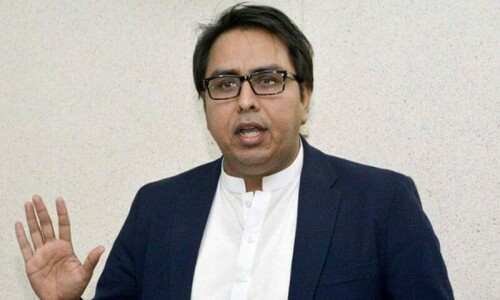LAHORE: Punjab School Education Department Secretary Abdul Jabbar Shaheen has claimed that 3.7 million children of 5-16 age group have been enrolled in public schools, including 700,000 children in class-I across the province.
By 2015, he says, the department will achieve hundred percent enrolment target and meet the Millennium Development Goals.
However, former Punjab chief secretary Kamran Rasool asked what major change had been brought about in schools environment and imparting of quality education that attracted such a large number of children in schools.
He said corporal punishment, still in vogue, was the major factor that led children to drop out of schools.
These diversified views were expressed at the launch of Annual Status of Education Report (ASER), Punjab, 2013, organised by the Punjab school Education Department in collaboration with the Idara-i-Taleem-o-Aagahi (ITA), at GOR-I on Monday.
Earlier, ITA Director Programmes Dr Baela Raza Jamil explained survey outcomes, stating that the percentage of out-of-school children of 6-16 years of age group was still standing tall at 16 percent in 2013 as was the case in the previous year.
She said some nine per cent children were never enrolled, while seven per cent had dropped out for one reason or the other.
“This is a big blow to the Punjab government as it is focusing enrolment drives in the backdrop of Article 25-A that asks the state to provide free and compulsory education to all children of 5-16 years of age children as well as Millennium Development Goals,” she asserted.
Ms Jamil said those 84 per cent children enrolled, including 20 per cent in private sector, were also not learning much as their competence in learning English, arithmetic, and language was deplorable.
She said the ASER survey also identified that, in Punjab, children enrolled in private schools were performing better compared to those studying in government schools. The trends in multi-grade teaching across schools are also mixed, Ms Jamil added.
School Education Department Secretary Abdul Jabbar Shaheen said only quality education attracted children to schools and the public schools were now attracting a large number of students.
He said the dropout rate had decreased markedly. He said the government had earmarked Rs11.5 billion for the provision of missing facilities at all girls’ schools across Punjab and boys schools in 11 districts in south Punjab.
Of 53,935 public schools in Punjab, Mr Shaheen said, the number of boy schools was higher while the number of female teachers was higher than male teachers.
He said girls were being provided stipend in 16 districts and the department was also in the process of recruiting 36,000 more teachers in the province.
Human Rights Commission of Pakistan Secretary General I.A. Rehman regretted that nothing was being done to offer meaningful education to children.
He said the ASER survey had gone global as it was being conducted in eight countries and covering almost half of the target world population.
He said the statistics about learning levels of students were quite disturbing, adding that the British Council’s report had also presented devastating analysis in terms of students’ learning levels.
Mr Rehman stressed the children should be taught in mother tongue so that they could pick up their lessons and could study English as a language at a later stage. Saying that Punjab’s education situation was better than other provinces, he expressed grave concern over the quality of education being imparted in other provinces.
He emphasised that all the provinces must be pushed to impart quality education.
Syed Babar Ali, pro-chancellor of Lahore University of Management Sciences, stressed that school education department should develop strong management committees in schools and provide lunch to students to ensure their nourishment.
Planning and Development education advisor Javed Malik, Open Society Foundation’s Nargis Sultana and advisor to chief minister Zakia Shahnawaz also spoke.













































Dear visitor, the comments section is undergoing an overhaul and will return soon.